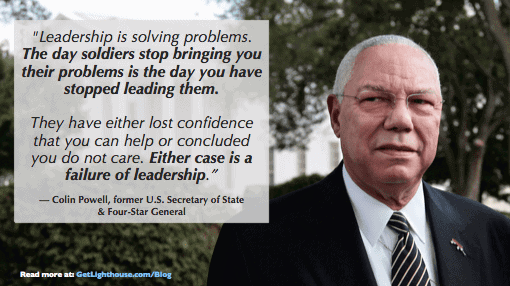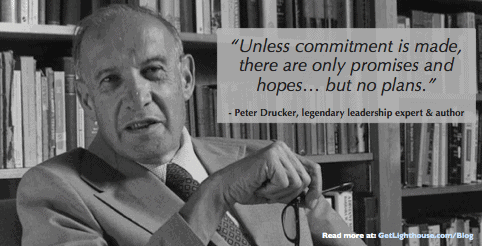How Managers Can Get More Feedback from Their Teams
If you’re like most managers, you probably wish you could get more feedback from your team. Quality feedback can help you all work better together, improve your leadership style, and ensure you catch issues before they become major problems.

Do you get enough feedback from your team?
What if despite your best efforts, your team is not coming to you with feedback as often as you’d like? How can you get your team to give you more feedback?
While your team members have to be the ones to come up with the feedback, there are many things you can do to make them more comfortable and effective at giving it. Here’s 5 approaches you can start using today with your team.
5 Approaches to Help You Get More Feedback from Your Team
A good manager takes accountability for the results they want.
If you want more feedback from your team, then you should first focus on the actions you can take to make it happen. These tactics will help you do your part to make your team more likely to give you the feedback you crave.

1) Ask!
It’s like the important lesson that Ed Catmull learned when he was running Pixar in the early days. He thought having an “open door policy” would help him hear everything he needed to. He was wrong.
As he recalled in his book, Creativity, Inc, he had to ask. Only then did he hear what he needed to.

Ask for specific feedback.
If you want more feedback from your team, you have to ask them.
And don’t just take the easy route and ask things like, “Do you have any feedback for me?” That’s vague and difficult to know what you really want without context.
Instead, ask them good, specific questions like:
- How could we change our team meetings to be more effective?
- Would you like more or less direction from me on your work?
- What could I do to make you enjoy your work more?
- Do you feel your ideas are heard by the team and I?
- What part of the day do you have the most energy and focus? What changes could we make to accommodate this?
By getting specific, you make it easier for them to give you more feedback. There’s a big difference between wanting feedback on the way you run meetings, and how you handled the departure of a low performing teammate.
Being specific in your request for feedback also makes you more effective. A vague question can give you a random set of answers, which makes it hard to tell what is affecting everyone or just one person.
Instead, if you ask everyone the same question, you can triangulate the feedback to see what problems are most important, and which ideas have the most buy in already.
Want more great questions to ask your team to get more feedback? Lighthouse gives you over 100 questions you can ask in your 1 on 1s; the perfect, private time to get more candid feedback from your team.
Bring out the best in all your team members and follow key best practices by signing up for your free trial here.

2) Be grateful and accepting of feedback
Think about the last time you gave someone tough feedback. Did they immediately accept it? Or, did they debate and challenge you on it?
Chances are they were at least a little defensive at first. If they were very defensive, you probably now think twice before giving them feedback again.
If you’re defensive with your team giving you feedback, don’t be surprised if they hesitate to give you feedback in the future, too.

Assume positive intent.
If a team member is giving you feedback, think of it as a gift. They cared enough to share it with you, so that things can get better for both of you.
Some pills are harder to swallow than others, but it doesn’t change the fact the intent is to help. Even if it wasn’t delivered in the most friendly manner, you can still learn from it. This is one of the many reasons Indra Nooyi, CEO of Pepsi, preaches looking for the positive intent in what happens.
Next time you get feedback from a team member, try this approach to ensure you continue getting feedback from them:
- Pause and thank them for the feedback before you say anything else.
- Ask them to share a recent situation where the feedback applies.
- Ask clarifying questions to ensure you understand the core of their feedback.
- Talk about possible solutions or changes with them, or explain the context they need to know.
Getting feedback isn’t always a pleasant experience. However, with a little practice and an open mind, you can make your team more comfortable giving you feedback. This then makes them more likely to want to give you more feedback in the future, too.

3) Take action
When you get feedback from your team, your work is just beginning. They shared feedback with you, because they want to see things change. Otherwise, why bother sharing it?
Remember the Progress Principle we’ve talked about many times here on the Lighthouse blog:

If something is important enough to bring up as feedback to their manager, it’s something they want to see progress on. If they don’t feel progress made on it, it will be discouraging.
A manager that doesn’t do anything with the feedback they receive is unlikely to get more feedback in the future, nor have an engaged team for the long term.
Turn feedback into action.
When you get their feedback, take a few minutes to discuss next steps, too. Work together on what, if anything can be done. This makes them feel heard, and helps them understand right away what progress may happen related to their feedback.
Every situation will be a little different for how to handle their feedback, so let’s work through a few scenarios:
- You change something: Your actions will validate their courage to give you feedback.
- They change something: You empower them to help create the kind of company that want to work for.
- You explain why it is that way: When you can’t change something, helping them understand why it is that way can help them empathize and better tolerate things.
Whether you can fix exactly what they’re worried about, or can only manage their expectations on the situation, talking about what can or cannot be done is a crucial step. Don’t let a discussion on feedback end without it.
Bring out the best in all your team members and follow key best practices by signing up for your free trial here.
What can I do if my team still resists?
Asking directly for feedback, being grateful, and taking action are great fundamentals to getting feedback. However, sometimes that’s not enough.
Sometimes there are issues on your team making them not open to giving feedback right now. A lack of trust or rapport, resentment, or past history can all cause it.
These last two approaches can help turn around some of your more shy, resistant, or quiet team members.

4) Use reciprocity
Are you giving your team feedback? Are you doing things they want or would appreciate? If not, you must learn about the power of reciprocity.
Reciprocity is built deep into the psyche of all of us. If you give someone a gift or do something for them, they’ll feel indebted to you and are more likely to return the favor, or do something else requested by you of similar value.
A famous study in the 1970s demonstrated its power:
“In 1971, Dennis Regan tested the strength of these two aspects of reciprocity in a study… During the experiment, Joe would disappear and bring back a soft drink for the participant. After this phase of the experiment was over, Joe would ask the participant to buy raffle tickets from him.
The more the participants liked Joe, the more likely they were to buy raffle tickets from him.
However, when Joe had given them a soda and thus indebted them to reciprocate, it made no difference whether the participants liked Joe or not.“
Reciprocity overrides feelings.
Robert Cialdini started the modern work of persuasion and behavioral economics with his best-selling book, Influence: the Psychology of Persuasion. He devoted an entire chapter of his book to reciprocity. The most telling story he shared on this principle takes us back to World War I.

A German soldier was sneaking across the trench-filled battlefield to capture and kill opposing troops. One time, he surprised a solider eating dinner. What happened next is stunning proof of reciprocity’s power:
“The frightened captive, with only a piece of bread in his hand, then performed what may have been the most important act of his life. He gave his enemy some of his bread. So affected was the German by this gift that he could not complete his mission.
He turned from his benefactor and recrossed the no man’s land empty-handed to face the wrath of his superiors.”
If reciprocity can save a soldier’s life, it can certainly work for you. Even if you don’t have a great relationship with everyone on your, while you work to fix that, reciprocity can help get you more feedback from them.
To paraphrase a great former U.S. President: Ask not what your team can do for you; ask what you can do for your team. Whether it’s some feedback, well-deserved praise, or something else they want, it’s likely to then in turn get them to give you more feedback.

5) Lead by example
There is nothing more important than the example you set as a leader. You are always on stage. Your team is watching what you do much more than what you say.
If you want feedback to be a key part of your team’s culture and regular habits, then you have to lead by example. Here’s a few ways to do that:
- Give them feedback and praise: As discussed above, it creates an opportunity for reciprocity, and is a good habit in general to motivate your best people, and improve everyone.
- Hold blameless postmortems and project reflections: When a big problem happens, or a major project finishes, take time to meet as a team to talk about what went right and wrong, and what to do differently next time. It’s a great way to get everyone to be introspective and thoughtful about improvement.
- Own up to your own mistakes: If you show that feedback is valued and you change because of it, they’re more likely to do the same. If you’re open to constructively criticizing yourself, it makes others more open to it as well.
The habits you create on your team can make all the difference in whether you get more feedback. As you build more of them, listen closely to your team; they may have even more good ideas to make feedback a key part of your team’s culture.
—
Getting anything good to happen on your team takes effort. If you are intentional and deliberate about creating a great team environment, getting more feedback is just one of many positive habits you can create.
Further Reading:
Looking to learn more about feedback, praise, and creating a great culture on your team? Here’s some great posts to read next:
- 5 fresh, new ways to give better feedback
- How to thank your employees in 5 simple, effective ways
- How to give effective praise to motivate your team
- The most important thing to create a great culture
- The unfiltered truth about company culture

And if you want help building more key habits to bring out the best in everyone on your team, then sign up for Lighthouse.
It’s purpose built to focus on what research and best practices show are the most important things for motivation, engagement and high performance. Start your free trial by clicking here.
